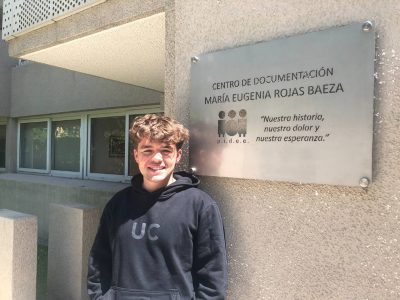Chancellor Syverud Provides Updates to University Senate on University Climate and Shared Governance
Greetings, everybody. I should say that I had Tom’s [Dennison] job [chair of the Employee Benefits Advisory Council] in another life at the University of Michigan. I was the chair of a similar body there. I’m aware of the [health care benefits] issues that have been discussed. Tom is so much more aware of the current system and how it works, but I’ll make the observation that we do occasionally change our third-party administrator. We used to have a company called POMCO, and we changed to Excellus largely because of the complaints we were getting from our employees then. These things seem to go in cycles. What seems to be happening right now from my 50,000-foot level is that the pricing of insurance benefits was largely based on estimates that occurred during COVID when nobody was getting elective treatments and surgery. And suddenly they’ve experienced a bubble of people getting health care, and the hardball tactics that were being described with providers have led many of the providers to say, “We can’t make this work. We’re just going to drop out of dealing with you.”
Excellus has a huge fraction of the third-party administrative market in upstate New York. The other choices aren’t numerous. Excellus is also being very aggressive with the employers in terms of what they want to charge employers. That’s the next concern coming up soon as we go toward open enrollment. All I can say is that I am aware that people need doctors and need access to urgent care. I’m aware of that. There’s a little bit of brinksmanship going on with the health care providers and with the employers right now. I think what Tom said is it’s new to Syracuse, but it is what’s been going on for more than a decade in other markets. So, we’re playing catch up and learning how you win these brinkmanship games for our employees. That’s a little more than you needed to know, and Tom can tell you if I got that wrong, but that’s how it feels to me.
One reason for this [Employee Benefits Advisory] council is because how this worked in the past was kind of this black box and suddenly whatever emerged was, “Surprise! You don’t have a doctor, and you’re going to pay a hundred percent more for it.” And then we had a Senate meeting, and it was too late to do much about it or even talk about it. We’ve been trying to get more integration with this council earlier in the year so that people representing all the constituencies affected have input and not the day open enrollment occurs. We’ll see how that works. From my perspective, folks, it’s worked really well in some of these early issues like the retirement fees and the dental [insurance]. I think facing the problems with Delta Dental that Professor Gray raised in this body was very helpful, but health benefits is such a bigger thing. So, it’s going to be harder in the year ahead.
The University overall, notwithstanding what I’ve just said, is in good shape right now, particularly in terms of finances, advancement, and enrollment. That’s kind of back-office stuff, but that’s pretty important for all our lives. We finished FY24, which ended on June 30 with a small surplus of $1.5 million on a budget of more than $1.7 billion. We are three months into a FY25, and we’re running a still smaller surplus–but still surplus, not a deficit–for this year. Our endowment has been steadily growing. By the end of this calendar year on Dec. 31, I expect we will achieve the very ambitious goals we set in 2019 when we launched the Forever Orange $1.5 Billion Campaign. And we’ll finish it on schedule, and we’ll close the campaign at the end of December.
We received this past year just under 45,000 undergraduate applications, the most in our history. We’ve enrolled a very strong undergraduate and transfer class despite historic changes from the Supreme Court and the truly unbelievable meltdown of the federal financial aid system. Many of our peers, I think, wish their news on finances and advancement and enrollment was like ours. So that’s good news. I thank a lot of people in this room who helped with all the aspects of that.
This is the first University Senate meeting for Lois Agnew as our interim provost and vice chancellor. She’s doing a fabulous job, in my humble view, and I’m very grateful to her. We have onboarded 94 new full-time faculty and 90 new part-time faculty this fall.
We last night formally opened our new D.C. center, which is on New Hampshire Avenue on DuPont Circle. That follows the successful opening of the new center in North Hollywood in Los Angeles. The new D.C. center provides home to academic programs for many schools and colleges and for students, a large group of whom are there this semester. It’s also where our Institute for Democracy, Journalism and Citizenship is based. It has offices for federal government relations, for alumni advancement, and for a local office for the D’Aniello Institute for Veterans and Military Families. I just saw it for the first time last night. It has outstanding classroom space and event space for the whole university. I thank a lot of people who came together to pull that off.
We also opened two new residence halls this fall primarily for sophomores on the main campus. Orange Hall was transformed from the Sheraton, and it now houses 390 students. Milton Hall, the apartment complex that was called the Marshall just behind Marshall Street, also opened. It was brought under the University’s housing umbrella. It has 270 students in it. That’s been a lot of work. That’s been the first stage of the strategic housing plan implementation.
Ten days ago, we hosted the largest Coming Back Together Reunion of our Black and Latino alumni ever. Fifteen hundred Black and Latino alumni and friends were here. There were events in every school and college, in the Dome, and in Hendricks Chapel. We dedicated the Barner-McDuffie house on 119 Euclid. And just lots of people came together to make that a very engaging experience. I’m really grateful to everybody, especially to the team in advancement for that. So, that’s all good news.
I thought I would conclude with a caution about what’s coming at us, what’s coming at higher education, including at selective, private institutions like Syracuse University. We’ve watched what’s been happening to our neighbors, including Cazenovia College and Wells College that closed. The finances are getting tougher in the sector every year. Several of our peer institutions, including distinguished R1 research universities, are facing severe budget restrictions. Lately, that includes American University and Penn State University as well as West Virginia University. They’re abruptly dealing with layoffs, elimination of programs, and repeated deficits. And a lot of other schools also are facing highly fraught labor relations that are impacting the daily experience of students and faculty, as well as the staff that really keeps those schools running and intact.
A lot of schools like us are facing a dramatically changing and more expensive landscape in intercollegiate athletics. That’s a topic on which I want to work with the newly named committees in charge of the Senate. I’ll say it’s an environment that’s highly unstable and that is at times quite problematic, including from an academic standpoint. Some work through the Senate Committee, through the AAUP, through the full Senate on that probably has to happen this semester if there’s going to be meaningful involvement in the decision making ahead.
My point of all this is it’s stressful. I think we’re in pretty good shape to face all this, but I’m also not surprised that, given all this going on and given the politics of the world, I’m seeing attacks on traditions of shared governance continue and become exacerbated from various directions. I talked about this at the first Senate meeting last year, and I’ve seen it accelerate. By shared governance, what I mean is that at this institution, it is still the case under our bylaws and our practices that the Senate, through its constituent stakeholders has authority over the curriculum and the granting of degrees. That’s not advisory, that’s authority. Everything else is advisory to the chancellor, but the chancellor actually occasionally asks for advice and provides information so that that advice can be given on a timely basis. That’s in theory how it’s supposed to work.
I’ve been seeing that model either vanish or be lost faith in it at other institutions. I’m saying to you that I haven’t lost faith in it here. It does, though, require that when we have challenges coming at us, that we do the work. By doing the work, I mean your job as senators, humbly, and my job as an administrator is not to show up and be entertained once a month at these meetings. Our job is actually to show up for the committees, to read the reports, to write the reports, to give the information, to get the information that’s necessary. So that when we make tough decisions, they are decisions that people have had an opportunity to advise on or, where the authority over, to decide. And, that’s work. I know that everybody complains about meetings and committees, but I guess given what we’re going into, the alternative of not doing the work is seeing some of the things happening that we’ve seen on other campuses. What most troubles me about other campuses is a lack of valuing all of the university, and all parts of the university. So I’m going to do the work, or try to do the work, encourage others to, and I hope you do, too. I’m sure you’ll have many questions when we get to that point.
Thank you.

